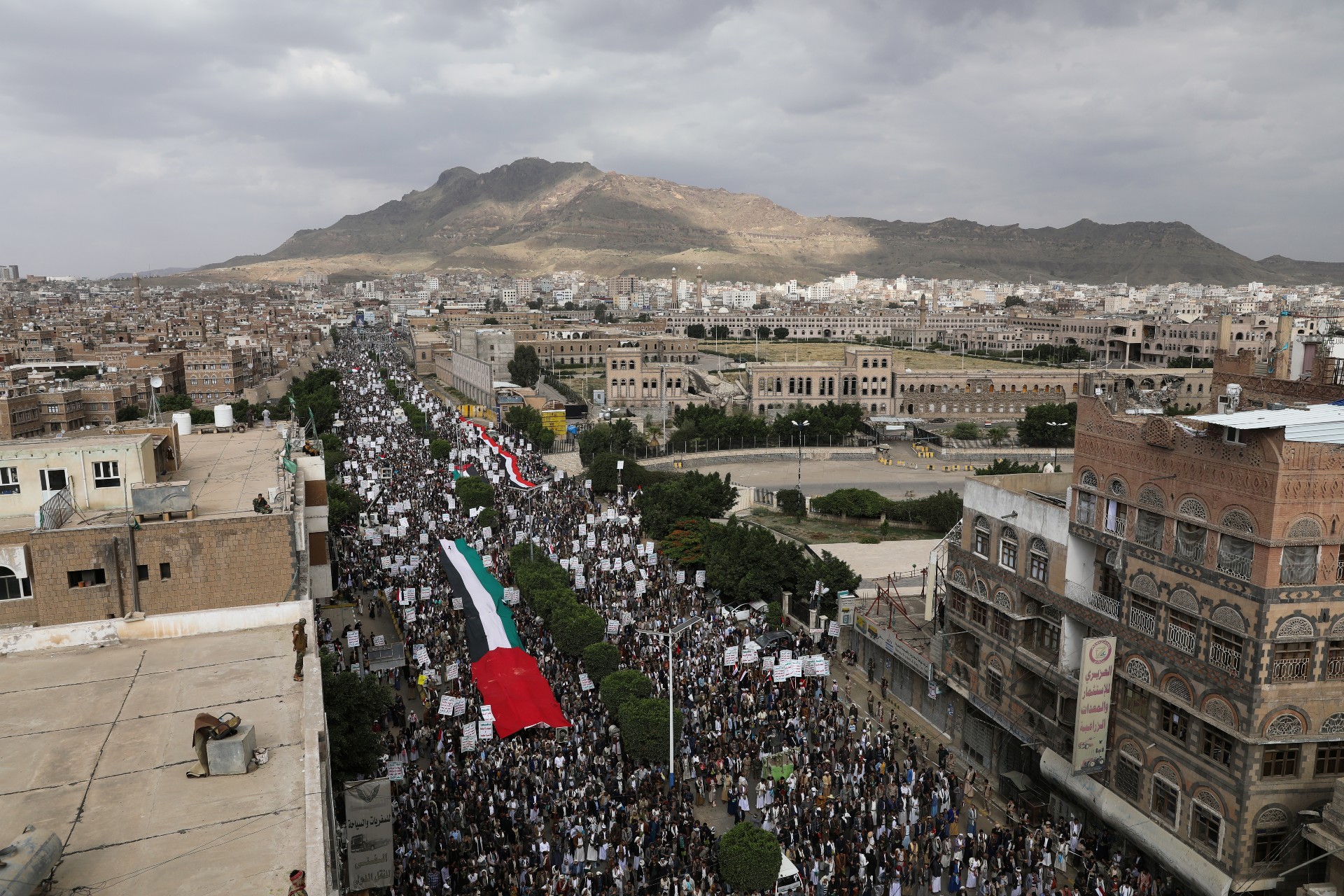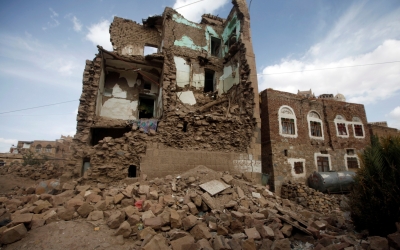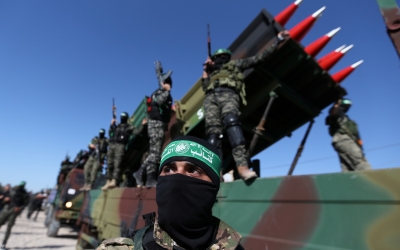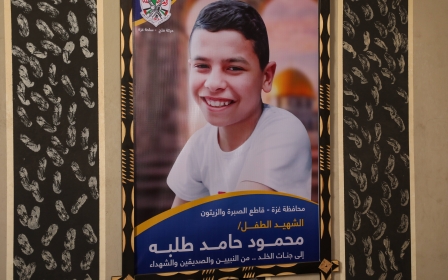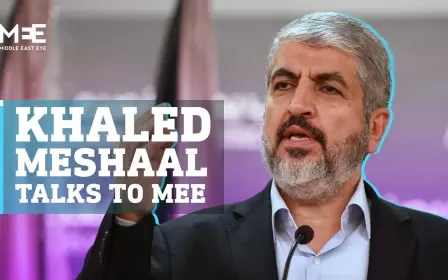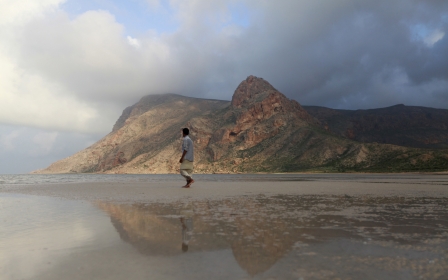Yemen: Hamas faces backlash after it honours Houthi leader
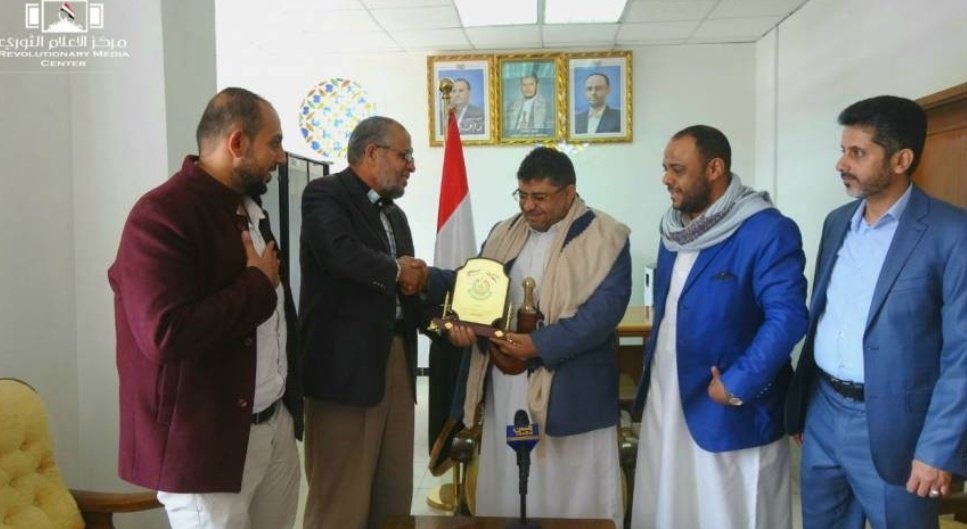
Around 2,500km separate Jerusalem from Sanaa, but the cause and suffering of Palestinians continues to endure in the hearts of Yemenis.
Despite six years of conflict, which has left the vast majority of Yemen’s population destitute, many Yemenis do not hesitate to donate what they can to Palestinians struggling under Israeli occupation and siege.
Hamas, the Palestinian movement that controls the Gaza Strip, is popular in the war-torn country, where many look up to its commitment to armed resistance against Israel. It is broadly respected by Yemenis of all political persuasions, despite the movement’s close relationship to Iran, which backs the Houthi movement in the Yemeni conflict.
During last month’s 11-day war between Hamas and Israel, Yemenis in all provinces sought ways to donate, and in Sanaa a vast protest was held in solidarity, attracting tens of thousands of people.
Stay informed with MEE's newsletters
Sign up to get the latest alerts, insights and analysis, starting with Turkey Unpacked
But on Sunday, opinions began to change. Mouath Abu Shemala, Hamas’ representative in Sanaa, met with Houthi leader Mohammed Ali al-Houthi and honoured him with a plaque in recognition of the group’s latest fundraising campaign for the Palestinian resistance.
The Houthi leader had launched the campaign last month donating his own jambiya, a traditional Yemeni dagger.
Among Houthi supporters the meeting was welcomed. But Houthi opponents were enraged by the exchange, not previously knowing the ties enjoyed by the movement with Hamas.
Pro-government Yemeni human rights activists, journalists and politicians have strongly criticized Hamas for honouring the Houthis.
Shawqi al-Qadhi, an MP, tweeted that he was “shocked” by the Hamas decision. “We are awaiting a full explanation from Hamas about its shocking attitude for us as Yemenis, does that person [in Sanaa] represent it officially? Was that done with the permission of its leadership and an official decision from it?” he asked.
Qadhi belongs to the Islah party, Yemen’s Muslim Brotherhood branch, and has been an outspoken supporter of Palestinians and Hamas.
Not everyone was surprised that the movement that regularly chants “death to Israel” had ties to Hamas.
Baraa Shiban, a human rights activist and former advisor to the Yemeni embassy in London, tweeted: “Yes, Hamas thanked the Houthis. By the way, this is not the first time. The resistance against Israel is a cover for repressive movements and sectarian militias, of which the Houthis isn’t the last.”
On Tuesday, Hamas was moved to comment on the uproar, insisting it takes no sides in the Yemeni conflict.
“Any statement, position, or behaviour that is understood as bias to any party or interference by the movement in the unfortunate conflict in Yemen and elsewhere is a personal position that does not express the movement and its leadership in any way,” it said in a statement.
However, this wasn’t enough for many Yemenis, who wanted Hamas to condemn Abu Shemala’s behaviour and deny that they had an office in Sanaa, where the Houthi administration is based.
Changed the picture
Khalid al-Masani, a resident of southern Taiz province, has always thought well of Hamas and was one of thousands of Yemenis who took to the street last month chanting slogans in support of Palestine.
“The picture of Hamas was shining in our minds and it was a symbol of dignity and resistance that we needed to teach to our children,” Masani told Middle East Eye.
“However, what happened this week in Sanaa has changed this picture to the opposite. Hamas is honouring the Houthis, who kill Yemenis every day, and that means Hamas is happy with what the Houthis are doing.”
Masani warned Hamas would lose its supporters in Yemen if it involved itself in the conflict.
'Hamas is honouring the Houthis, who kill Yemenis every day, and that means Hamas is happy with what the Houthis are doing'
- Khalid al-Masani, Taiz resident
“I was the first to protest for Palestine and I usually donate and encourage others to, but now I’ve realised that I didn’t really know this Palestinian movement,” he said, adding that the Hamas statement was totally unsatisfactory.
“I’m not here to say that Hamas has betrayed us, because Hamas isn’t our ally, but I’m saying that Hamas stands with the Houthis against us,” he explained.
“Hamas has an office in Sanaa but not in Aden [where the Yemeni government is based]. Hamas honours the Houthis but not the government. It would be better if Hamas closes its office in Sanaa and keeps silent during this difficult time in Yemen.”
Masani noted that Hamas has a good relationship with Iran and its allies in the region, including the Houthis, so Yemenis should take this into consideration.
“We know that Hamas has a good relationship with Iran but that doesn’t mean they should support the Houthis, even morally, as they kill Yemenis and all Yemenis stand with the Palestinian resistance,” he said.
Polarised populace
Hamid, a resident of Sanaa city, answered the Houthis’ call for donations and gave what he could to the Palestinians in May.
“I’m happy to see the Houthis help our brothers in Palestine, but shocked to see the Hamas representative in Sanaa honour the Houthis,” Hamid told MEE. “Hamas knows the Yemeni dispute and going to this step of honouring a Houthi leader means they are against the other side in Yemen.”
After six years of conflict, which has killed more than 230,000 people and left some 80 percent of its population of 30 million reliant on aid, Yemenis are more polarised than ever.
The warring parties divide countries, movements and international organisations along the lines of “either with us or against us”, with little leeway in between.
Hamid added: “I think Hamas' representative in Sanaa deliberately honoured the Houthis as a kind of gratitude, but he didn’t think about the outcomes of this step as Hamas didn’t honour the Islah party, which also led a fundraising campaign in the south.”
Islah, whose armed wing fights on behalf of the Yemeni government, has raised funds for Palestine for decades, long before the Houthis began doing the same.
On Thursday, it condemned the Hamas attitude to “Houthi crimes”.
“It would have been better for Hamas to respect the right of Yemeni people to resist the Houthi crimes and to distance itself from falling into this disgraceful act, especially as it is resisting injustice and crime. It is not logical that Hamas accepts for the Yemenis what it rejects for the Palestinian people,” it said in a statement.
A Houthi member in Sanaa tried to play down the row, telling MEE that a relationship between the Houthis and Hamas was natural as Yemenis are the brothers of Palestinians.
“Palestine is in the hearts of Yemenis, and the Sanaa government [the Houthis] is doing its best to support the resistance in Palestine, so it is normal that Hamas honours Mohammed Ali al-Houthi, who donated his own jambiya,” he said.
The Houthi member, who spoke on condition of anonymity, said there was no need for such anger.
“Most of the Yemenis who criticise this honouring live outside Yemen, and some in countries who have normalised with Israel, so who do they want Hamas to honour?” he said.
“This honouring is for all free Yemenis around the country and it isn’t only for Mohammed Ali al-Houthi.”
Middle East Eye delivers independent and unrivalled coverage and analysis of the Middle East, North Africa and beyond. To learn more about republishing this content and the associated fees, please fill out this form. More about MEE can be found here.


